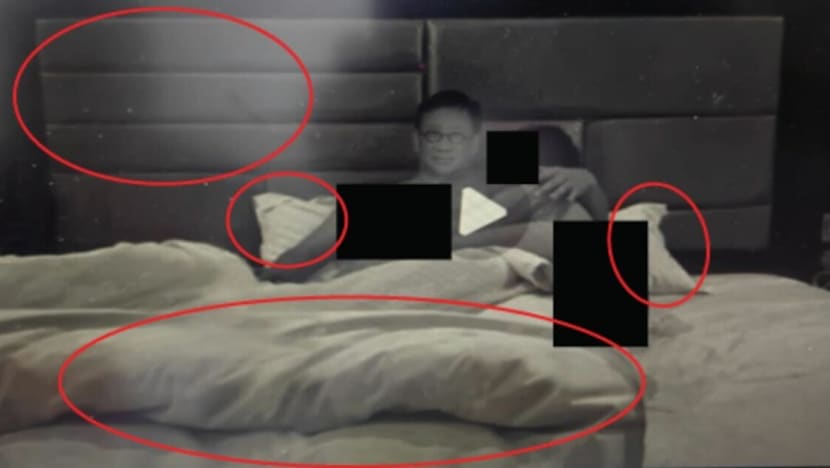At least 10 Malaysian politicians targeted in AI sex video blackmail scam; police probe underway
Communications Minister Fahmi Fadzil and former Economy Minister Rafizi Ramli are among those who have received email threats asking for payment of US$100,000.

A screengrab of the blackmail video sent to Subang MP Wong Chen with sensitive parts redacted, according to his press statement on Sep 14, 2025. Wong compared it with a screengrab of the video purportedly sent to Pandan MP Rafizi Ramli, and circled in red elements he said were identical. (Image: Wong Chen)
KUALA LUMPUR: Malaysian authorities are investigating reports of politicians allegedly blackmailed with fake pornographic videos made using artificial intelligence (AI).
At least 10 politicians, including Communications Minister Fahmi Fadzil, have received emails that threaten to circulate AI-generated lewd videos depicting their faces unless they pay US$100,000.
Fahmi said on Sunday (Sep 14) the lawmakers targeted include former economy minister and Pandan Member of Parliament Rafizi Ramli, Subang MP Wong Chen, Sungai Petani MP Taufiq Johari and Deputy Youth and Sports Minister Adam Adli.
Selangor executive councillors Najwan Halimi and Fahmi Ngah, as well as Senator Manolan Mohamad and Kulim assemblyman Wong Chia Zen were also among those who received the threats, Fahmi added.
Local media outlets reported that Deputy Plantation and Commodities Minister Chan Foong Hin, Tasek Gelugor MP Wan Saifal Wan Jan and Bangi MP Syahredzan Johan also received the emails.
According to former economy minister Rafizi and Subang MP Wong, the emails they received on Friday also included a QR code for transferring the money.
Wong, who has been an MP for 13 years, said he has never felt less safe as a lawmaker than he does today.
“It is ironic that as a parliamentarian from Parti Keadilan Rakyat, the ruling party of the Madani government, I feel less safe as a legislator now compared to my time during previous governments as an opposition MP,” he said in a statement on Sunday.
In a statement the same day, Bukit Aman Criminal Investigation Department director M Kumar said four police reports have been lodged.
According to him, the first case was reported by Subang MP Wong on Sep 12, reported Bernama.
The sender had threatened that failure to make payment within three days would result in a fake pornographic video using his face being released on social media.
Senator Nelson W Angang, Kulim assemblyman Wong and Sungai Petani MP Taufiq Johari subsequently lodged police reports, all of which indicated they received a similar demand.
“The Royal Malaysia Police is treating these reports with the utmost seriousness,” said Kumar, as quoted by local media outlets.
“We will take strict, comprehensive and uncompromising action against any party involved in producing, distributing or using such material.”
All reports on the blackmail attempts are being investigated under Section 385 of the Penal Code for blackmail and Section 233 of the Communications and Multimedia Act 1998 on the improper use of network facilities or services, said Kumar, as reported by news agency Bernama.
If convicted under Section 385, offenders may face up to seven years in prison, a fine, whipping or a combination of these punishments. Meanwhile, Section 233 carries a maximum penalty of RM500,000 and up to two years in prison, according to Malay Mail.
Kumar added that the police are working with the Malaysian Communications and Multimedia Commission (MCMC) to track down the sender of the emails and other relevant information for further investigation.
Checks revealed the emails used almost the same wording, had the same screenshots and are believed to have been sent from the same email address, said Communications Minister Fahmi at the "Bakti Komuniti Madani" event to promote community service in Penang on Sunday.
He said that the government viewed these incidents seriously and has instructed the MCMC to work closely with the police to track down those responsible for the email threats, which were apparently made via Gmail.
Fahmi said his ministry would seek Google’s help to identify the party responsible for creating and sending the emails.
In a Facebook post, Fahmi also shared a screenshot of the email he received on Sep 12, which appeared to be from a Gmail address.
















